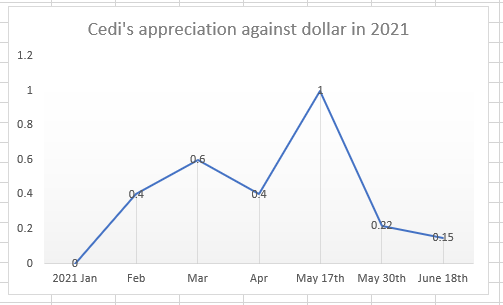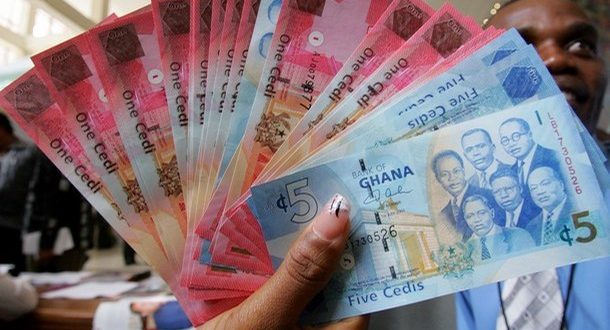Even though the cedi has not depreciated against the US dollar since the beginning of the year, it has started showing signs of weakness, as data published by the Bank of Ghana indicates its gains have begun to slow since the beginning of the year.
According to the interbank FX rates, as of Friday June 18, 2021, the cedi has appreciated by 0.15 percent against the dollar, compared to 1 percent a month ago (May 17) and 0.22 percent at the end of May – sparking some concerns that the local currency may be on the path to experiencing its usual depreciation against the US dollar.

The cedi’s good form since the beginning of the year has been partly attributed to the decision of the Monetary Policy Committee of the Bank of Ghana to keep the policy rate at 14.5 percent for more than a year, whereas other economies are reducing theirs – a decision which made the country’s investment climate attractive to foreigners who wish to invest in the domestic financial market. Going by that logic, it presupposes that, the decision to cut the policy rate may have triggered a few outflows of investments, thereby, weakening the local currency.
But commenting on this in an interview with the B&FT, economics lecturer at the University of Ghana, Dr. Patrick Asuming, said even though there is a correlation between foreign investor’s reaction and policy rate decision, it is early days yet to attribute the cedi’s sudden partial weakness to the cut in policy rate by 100 basis points at the end of May.
“I think for this particular case, it is too early to say the policy rate cut is responsible for the weakness of the cedi. But in general, when we cut our rates while others are keeping theirs constant, we should expect it is going to reduce the demand for cedi denominated assets and, that way, the cedi may lose value. But I think it’s little too early to draw any conclusive judgement about that.
I wouldn’t raise the alarm bells yet because when the currency is in real trouble, sometimes, even within a week, it can depreciate so much. So, I don’t think we should start worrying; it is too early to press the panic button,” he said.
Early days yet though, but with economic activities picking up, and import business getting back to normal, it is important the central bank strengthens its buffers to shore up the currency. Gross International Reserves as of April 2021 stood at US$10.9 billion, providing cover for 5.1 months of imports of goods and services.
The bank is also on course with its FX forward auction programme which seeks to pump US$300 million into the economy by end of the year. Out of this amount, US$50 million will be pumped into the economy bi-weekly till the end of the first quarter. Then, from the second quarter onward, it will be slashed by half till the end of the year.
And just last week, the central bank introduced a domestic gold purchase programme which is aimed at diversifying the traditional means by which the country builds its foreign exchange reserves.
The domestic gold purchase programme, according to Dr. Ernest Addison, Governor of the Bank of Ghana, will pave the way for the central bank to grow its foreign exchange reserves to foster confidence, enhance currency stability, create a more attractive environment for foreign direct investments and economic growth. It will further enable the bank leverage its gold holdings to raise cheaper sources of financing to provide short-term foreign exchange liquidity.










